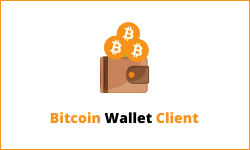You don’t have to use a private wallet for your crypto transactions. An exchange wallet is always an option.
Keeping all your funds on exchanges, though, comes with risks of its own.
This is why having a private wallet is recommended for investors and traders.
However, besides the different private wallet options, there are also various wallet brands to consider.
Here, we’ll show you how to pick the perfect Bitcoin wallet client for your crypto needs.
Security Before Anything Else
Bitcoin and other crypto wallets need to be safe above everything else.
Hacking and other security risks are very much present in the crypto world.
For starters, when checking out at a wallet, take a look at the URL section. Does it start with “HTTP” or “HTTPS?”
If the former is the case, forget about that wallet client. Only wallets with HTTPS in their addresses boast secure protocols.
A secure wallet client should also have a 2FA (two-factor authentication) option.
When enabled, this sign-in protection requires the user to sign in to the wallet with their personal information, and confirm the sign-in via email or a smartphone/tablet device.
Even though 2FA is almost always optional, we recommend using it, especially with cryptocurrencies.
Finally, look for a “multi-sig” feature. This is short for multi-signature and presents an added layer of security to thwart hack attempts.
Simply put, the multi-sig option asks for more than a single private key to confirm any crypto transaction.
In other words, it’s like a lockbox – two parties with different keys are needed to open the box.
Bitcoin Ownership
This might sound like a complete no-brainer, but it’s crucial that you make sure you’re the one who owns the Bitcoin you’re using.
For example, exchange wallets have your private key information, which means that, in a way, they own your Bitcoin as well.
They may not steal it, but if the exchange ends up hacked, the cybercriminals might. This has been known to happen before.
Similarly, many private wallets don’t guarantee that you’re going to be the one who owns your Bitcoin. This boils down to private key sole ownership.
If you aren’t the sole owner of your private key on a Bitcoin wallet client, you technically aren’t the only owner of your Bitcoin, either.
Make sure that the wallet guarantees sole private key ownership to the user.
Avoid Address Reuse
Many wallet clients reuse addresses on their platform, to make things quicker, more straightforward, and cheaper.
This might not be a huge problem, but Hierarchical Deterministic (HD) wallets, for instance, always utilize new BTC addresses, which increases the user’s privacy.
Address reuse, however, has been a thing for years now. It’s only recently that HD technology has been streamlined.
Transparency
The world of cryptocurrency is based on transparency.
What makes cryptos different from fiat money is that the transactions are accessible by anyone and completely open and transparent.
Although the crypto transactions are always transparent, platforms such as exchanges and wallets don’t have to be.
When choosing a Bitcoin wallet client, make sure that you check out the wallet’s website.
See if they are open with who they are, where they are located, and how they operate.
Now, open-source wallets are more transparent, but aren’t necessarily the best wallet option, unless they are client-side, meaning that everything sensitive happens on the user’s side of things (typically on the user’s device, browser, etc.)
So, look for transparent, open-source, client-side wallet projects.
Anonymity and Reputability
Some wallets require a verification process. They ask about your name, location, and other typical personal information.
Some people are completely fine with this. Others, on the other hand, cherish their anonymity.
Research the client’s website and see if they offer the discretion levels you’re looking for.
Then there’s the reputability factor.
Although small, non-reputable wallet projects aren’t necessarily bad choices, reputable wallets are generally trustworthy by default.
Your Bitcoin Wallet Client of Choice
All these factors should go into the equation when choosing a Bitcoin wallet client.
Pay attention to the platform’s security and transparency, and make sure that you’re the only one who owns the private address assigned to you.
For extra safety, choose an HD wallet.
Finally, depending on whether you’re looking for anonymity, research the wallet before signing up for it.
There are both anonymous and public options available out there that can be equally brilliant.



0 Comments